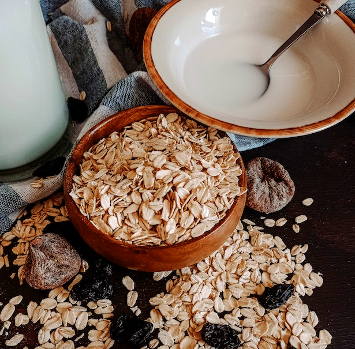In the UK and the US, oat milk has rapidly risen to the top of the popularity list for dairy-free milks. According to The Grocer magazine, UK oat milk sales grew nearly 50% year on year to August 2021. Those watching their weight will naturally ask, is oat milk good for weight loss? It’s today’s quick question …
Is Oat Milk Good For Weight Loss?
Yes, oat milk can be a good replacement in your diet when weight loss is the goal. Switching out fattening cow’s milk with oat milk, along with other dietary changes will help you shed the extra pounds you’re trying to shift.
Watch: Mic The Vegan reacting to the “Oatly is as bad as Coca Cola” claim:
(Mic addresses oat milk health questions and fat content specifically about 12 minutes in)
When I discovered delicious barista oat milk in freshly percolated coffee I thought, “this is progress!”.
It is hands down my favourite dairy-free milk for coffee. But when it comes to tea, it’s still the good old-fashioned soya milk for me!
Oat milk is a luxurious, creamy product with a similar taste to cow’s milk so it’s no wonder we’re lapping this stuff up like it’s going out of fashion.
Is Oat Milk Fattening?
 No, oat milk is not fattening because it’s very low in saturated fat and high in fibre. The sugar content and calorie count is also low but the protein content is high.
No, oat milk is not fattening because it’s very low in saturated fat and high in fibre. The sugar content and calorie count is also low but the protein content is high.
This makes it the perfect option for those who are watching their weight, while not compromising on taste. You would have to drink buckets of the stuff to gain weight.
Oat milks will generally be low in fat overall and often the saturated fat content is so vanishingly small, it’s not included on the nutrition panel.
I just checked one of my favourite oat milks and the sat fat content is 0.2g per 100ml … I think we can say with good certainty that oat milk is not fattening.
What Are The Negatives Of Oat Milk?
The negatives of oat milk are few and far between. Compared to other dairy free milks, oat milk is usually higher in calories but about the same as cow’s milk.
 Apart from the obvious concerns for those with an oat allergy, there are additives in oat milks which you should be aware of.
Apart from the obvious concerns for those with an oat allergy, there are additives in oat milks which you should be aware of.
Binding and emulsifying agents are common in most commercial dairy free milks and oat milk is no exception.
Looking at our Oatly “Whole Oat Drink” I can see the ingredients include rapeseed oil and dipotassium phosphate. The latter being listed as an acidity regulator.
There are also some vitamin and mineral fortifications, the same as you would find in your breakfast cereal, for example.
So this particular product is pretty minimal on the additives. Some other ‘barista’ blends may contain more additives to improve the performance and they’re mostly used to stop the ‘splitting’ which can be common with dairy free milks.
Dipotassium phosphate is worth a quick mention. While it has been evaluated as ‘generally recognised as safe’ by the FDA, there are many who believe it should be treated with caution.
Prolonged, larger doses can upset your body’s phosphate balance which can lead to side effects like headaches, dizziness and arterial stiffening.
But before you freak out, one or two lattes a day with half a mug of oat milk in there is unlikely to cause you any problems, unless you have pre-existing conditions.
It’s always worth reading your food labels and educating yourself on what you’re actually putting in your tummy 🙂
Related: Can Almond Milk Upset Your Stomach?
Why Not DIY Your Own Oat Milk?
If you like to know exactly what your oat milk is made of then your best bet is to get yourself an oat milk maker. There’s quite a bit of choice on the market now.
 Being vegan means we cannot allow cows to be exploited for their precious white gold. It’s not designed for us anyway.
Being vegan means we cannot allow cows to be exploited for their precious white gold. It’s not designed for us anyway.
But commercial oat milk is basically ultra processed food (UPF). Yes, UPF is everywhere these days and the food additives business is massive. It’s difficult to avoid UPF.
So cut out the factories and order something like this. The modern nut milk makers (which can also make oat milk) take all the hard work out of the task.
… and you don’t have to put dipotassium phosphate in there.
Better yet, if you’re vegan you can shut down those aggressive anti-vegan carnivore types who bang on about ‘frankenstein food’ … or whatever!
I hope this quick article has helped you answer your question today. If so please share with your friends and if not, please take a moment to comment below with what you’d like to know. I always reply.
Thanks for reading and have a compassionate day!
Rohan.
